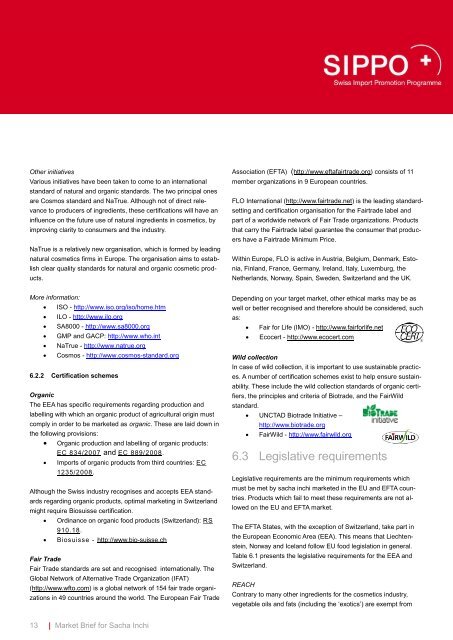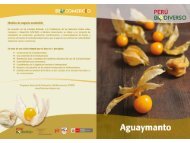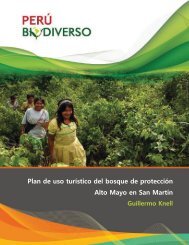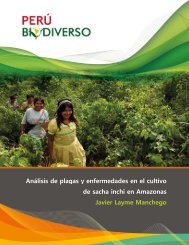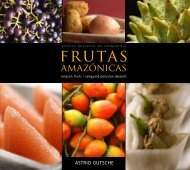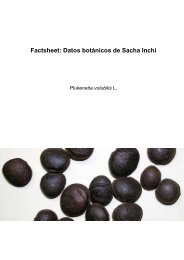Market Brief for Sacha Inchi.
Market Brief for Sacha Inchi.
Market Brief for Sacha Inchi.
Create successful ePaper yourself
Turn your PDF publications into a flip-book with our unique Google optimized e-Paper software.
Other initiatives<br />
Various initiatives have been taken to come to an international<br />
standard of natural and organic standards. The two principal ones<br />
are Cosmos standard and NaTrue. Although not of direct rele-<br />
vance to producers of ingredients, these certifications will have an<br />
influence on the future use of natural ingredients in cosmetics, by<br />
improving clarity to consumers and the industry.<br />
NaTrue is a relatively new organisation, which is <strong>for</strong>med by leading<br />
natural cosmetics firms in Europe. The organisation aims to estab-<br />
lish clear quality standards <strong>for</strong> natural and organic cosmetic prod-<br />
ucts.<br />
More in<strong>for</strong>mation:<br />
� ISO - http://www.iso.org/iso/home.htm<br />
� ILO - http://www.ilo.org<br />
� SA8000 - http://www.sa8000.org<br />
� GMP and GACP: http://www.who.int<br />
� NaTrue - http://www.natrue.org<br />
� Cosmos - http://www.cosmos-standard.org<br />
6.2.2 Certification schemes<br />
Organic<br />
The EEA has specific requirements regarding production and<br />
labelling with which an organic product of agricultural origin must<br />
comply in order to be marketed as organic. These are laid down in<br />
the following provisions:<br />
� Organic production and labelling of organic products:<br />
EC 834/2007 and EC 889/2008.<br />
� Imports of organic products from third countries: EC<br />
1235/2008.<br />
Although the Swiss industry recognises and accepts EEA stand-<br />
ards regarding organic products, optimal marketing in Switzerland<br />
might require Biosuisse certification.<br />
� Ordinance on organic food products (Switzerland): RS<br />
910.18.<br />
� Biosuisse - http://www.bio-suisse.ch<br />
Fair Trade<br />
Fair Trade standards are set and recognised internationally. The<br />
Global Network of Alternative Trade Organization (IFAT)<br />
(http://www.wfto.com) is a global network of 154 fair trade organi-<br />
zations in 49 countries around the world. The European Fair Trade<br />
13 | <strong>Market</strong> <strong>Brief</strong> <strong>for</strong> <strong>Sacha</strong> <strong>Inchi</strong><br />
Association (EFTA) (http://www.eftafairtrade.org) consists of 11<br />
member organizations in 9 European countries.<br />
FLO International (http://www.fairtrade.net) is the leading standard-<br />
setting and certification organisation <strong>for</strong> the Fairtrade label and<br />
part of a worldwide network of Fair Trade organizations. Products<br />
that carry the Fairtrade label guarantee the consumer that produc-<br />
ers have a Fairtrade Minimum Price.<br />
Within Europe, FLO is active in Austria, Belgium, Denmark, Esto-<br />
nia, Finland, France, Germany, Ireland, Italy, Luxemburg, the<br />
Netherlands, Norway, Spain, Sweden, Switzerland and the UK.<br />
Depending on your target market, other ethical marks may be as<br />
well or better recognised and there<strong>for</strong>e should be considered, such<br />
as:<br />
� Fair <strong>for</strong> Life (IMO) - http://www.fair<strong>for</strong>life.net<br />
� Ecocert - http://www.ecocert.com<br />
Wild collection<br />
In case of wild collection, it is important to use sustainable practic-<br />
es. A number of certification schemes exist to help ensure sustain-<br />
ability. These include the wild collection standards of organic certi-<br />
fiers, the principles and criteria of Biotrade, and the FairWild<br />
standard.<br />
� UNCTAD Biotrade Initiative –<br />
http://www.biotrade.org<br />
� FairWild - http://www.fairwild.org<br />
6.3 Legislative requirements<br />
Legislative requirements are the minimum requirements which<br />
must be met by sacha inchi marketed in the EU and EFTA coun-<br />
tries. Products which fail to meet these requirements are not al-<br />
lowed on the EU and EFTA market.<br />
The EFTA States, with the exception of Switzerland, take part in<br />
the European Economic Area (EEA). This means that Liechten-<br />
stein, Norway and Iceland follow EU food legislation in general.<br />
Table 6.1 presents the legislative requirements <strong>for</strong> the EEA and<br />
Switzerland.<br />
REACH<br />
Contrary to many other ingredients <strong>for</strong> the cosmetics industry,<br />
vegetable oils and fats (including the ‘exotics’) are exempt from


